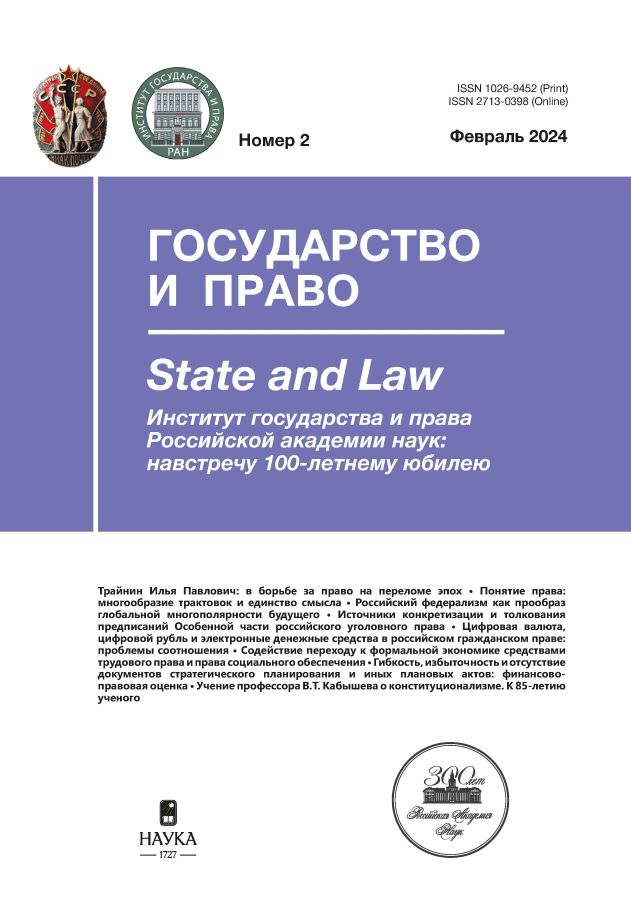Trends in the combination of individual and collegial in domestic criminal and civil, arbitration, administrative proceedings
- Authors: Sharipova A.R.1
-
Affiliations:
- Ufa University of Science and Technology
- Issue: No 2 (2024)
- Pages: 64-73
- Section: Court, prosecutor’s office, bar, notarial system
- URL: https://rjmseer.com/1026-9452/article/view/649004
- DOI: https://doi.org/10.31857/S1026945224020066
- ID: 649004
Cite item
Abstract
All types of modern litigation are characterized by a combination of individual and collegial principles. The commonality of the concept of justice determines the conceptual universality of most institutions of criminal, arbitration, civil and administrative proceedings. It follows from this that the criteria and principles for determining the ratio of collegial and individual are or should be approximately the same in all types of processes. Recent years have been marked by an active reform of the rules on the composition of the court in these types of justice, but the novelties are not always uniform or at least coordinated. The author attempts to identify the patterns of formation of the sole or collegial composition of the court within certain types of legal proceedings and justice in general. The tendencies of modern procedural law in determining the ratio of individual and collegial in the courts of the first, appellate and cassation instances are analyzed separately.
Full Text
About the authors
Aliya R. Sharipova
Ufa University of Science and Technology
Author for correspondence.
Email: nord-wind23@mail.ru
Doctor of Law, Associate Professor, Associate Professor of the Institute of Law
Russian Federation, UfaReferences
- Alieskerov M. A. Collegial and sole consideration of civil cases in courts of second instance // Arbitration and Civil Procedure. 2008. No. 9. Pp. 33–36 (in Russ.).
- Vereshchagin A. N. On the origin of the Russian judicial system and its prospects // Law. 2019. No. 4. Pp. 54–66 (in Russ.).
- Galuzo V. N., Kanafin N. A. On the Court of Intellectual disputes in the system of arbitration courts of the Russian Federation // Law and the State: Theory and Practice. 2019. No. 12. Pp. 100–103 (in Russ.).
- Gamidova E. G. Consideration of administrative cases by way of appeal under the Code of Administrative Procedure of the Russian Federation // Leningrad legal journal. 2016. No. 4. Pp. 187–198 (in Russ.).
- Gizatullin I. A. Procedural independence of judges: the essence and problems of ensuring // Russ. Journal of Legal Studies. 2019. Vol. 6. No. 1. Pp. 105–115 (in Russ.).
- Golovko L. V. The state and its criminal proceedings. M., 2022. P. 93 (in Russ.).
- Guskova A. P., Sokolova N. G. On controversial issues of the implementation of the right of the accused to consider a criminal case by a court with the participation of jurors // Russ. judge. 2008. No. 2 (in Russ.).
- Demichev A. A., Ilyukhina V. A. On some controversial problems of the principles of the civil process in Russia (analogy of law and analogy of law, combination of individual and collegial principles in legal proceedings) // Arbitration and Civil Procedure. 2020. No. 7 (in Russ.).
- Dikarev I. S. Issues of jurisdiction of criminal cases to military courts // Law in the Armed Forces. 2020. No. 6. Pp. 63–68 (in Russ.).
- Kartsevskaya O. I. Correlation of individual and collegial principles in the administration of justice in the history of Russia // Herald of the Vladimir legal institute. 2021. No. 1. Pp. 150–158 (in Russ.).
- Materov N. V. Appeal – alone! // EZH-Yurist. 2010. No. 34. P. 5 (in Russ.).
- Panokin A. M. The system of reviewing decisions of magistrates in criminal cases within the framework of the model of autonomization of world justice // Justice of the Peace. 2016. No. 3. Pp. 19–23 (in Russ.).
- Legal approaches of the Arbitration Court of the Ural District regarding the resolution of issues related to the application of the Arbitration Procedural Code of the Russian Federation, developed during a working meeting on October 25, 2019 // Economic Justice in the Ural District. 2020. No. 2 (in Russ.).
- Tarasov A. A. Individual and collective in criminal proceedings: legal and socio-psychological problems. Samara, 2001. P. 8 (in Russ.).
- Terekhova L. A. The system of judicial review in the CPC of the Russian Federation // Herald of the Civil Procedure. 2012. No. 3. Pp. 29–51 (in Russ.).
- Trofimova M. S. Individual or collegial appeal: arguments “for” and “against” // Herald of the Novgorod University. 2012. No. 69. Pp. 97–100 (in Russ.).
- Shchepalov S. V. Appeal in civil proceedings: on the question of the composition of the court // Russ. Justice. 2009. No. 6 (in Russ.).
- Cross F. B., Tiller E. H. Understanding collegiality on the court // University of Pennsylvania Journal of Constitutional Law. 2008.
Supplementary files










